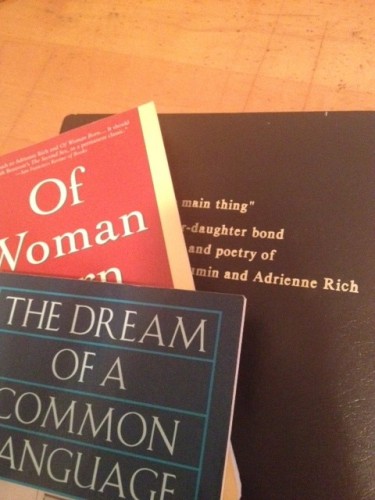
I remember one shadowy afternoon in the winter of 1996 in college, sitting across from my thesis advisor talking about my work on three 20th century poets. I picked up a sort of convoluted slinky thing made of cardboard that sat on her desk. In my hands it morphed, rotating in and out and folding in on itself and out again. It was a science experiment, a shell, a marvel of simplicity and complexity in a desk toy. I couldn’t stop playing with it.
“Adrienne Rich gave me that,” my advisor said casually.
“She did?” My eyes grew wide and I looked down at the cardboard spiral in my hand.
Years later, I attended a reading Adrienne Rich gave at Harvard. I dashed down to the front after she was finished to meet her, and was struck by how tiny and bowed she was. And yet her miniscule person emanated a power I’ve rarely experienced. Her eyes crinkled when I told her I’d written about her, and she managed to make me feel that she cared even though she’d surely heard that a zillion times before.
Adrienne Rich’s poetry has been important to me for a long time, some of her words so familiar they have become incantations, stones worn smooth with my mind’s constant turning over and rubbing of them. She is one of a handful of poets – the others are William Wordsworth, Mary Oliver, Wendell Berry, Gerard Manley Hopkins, Stanley Kunitz – who I literally hear inside my head on a daily basis.
I’ve written about her here before, many times. I consider her poem Towards the Solstice, which contains the lines “and there is still so much here we do not understand” a totem: to a person like me for whom light and dark and the turning of the earth are literal, visceral parts of my human experience it is among the very greats. Power, her poem about Marie Curie makes me believe that my aching, painful sensitivity might somehow also be an asset: “her wounds came from the same source as her power.”
My mind is flooded with Adrienne Rich’s images, the great dark birds of history and the book in which our names do not appear and poetry being a land where she wasn’t anyone’s mother. Yes, she was angry, filled with what the New York times called “towering rage,” but she was also brave and honest, a woman pursuing authenticity even when it meant howling into the darkness and rejecting the known. I am familiar mainly with her poetry and with the prose of Of Woman Born, a book about “motherhood as experience and institution” (from its own subtitle). In this part of her canon, the theme of creation, and its inextricable, complex relationship with procreation is central. The female body is heavy and present, haunting almost all of her poems.
After I learned of her death I went back to my thesis and reread the chapter on her, but, even more importantly, I went back to the texts I read for the first time as I wrote it. There are volumes of poetry and prose, all underlined and full of marginalia. I can easily close my eyes and be back in my small study carrel in Firestone Library, reading these words and feeling them sink in, aware of something enormous turning over inside of me for the first time, an animal part of my spirit that was never quiet again after that initial awakening. Rich herself midwifed that birth of a part of me, and remembering those days is bittersweet.
I don’t know how to adequately describe how vital this woman and her words are to me. I grieve her loss while knowing that her words will live on, for me and for generations more, their incandescence undimmed. I’ll just end with one of my favorite passages – resonant because of many things, but not least because I relate to the idea of reconstituting something, with no extraordinary power – from the last stanza of her poem Natural Resources:
My heart is moved by all I cannot save:
so much has been destroyed
I have to cast my lot with those
who age after age, perversely,
with no extraordinary power,
reconstitute the world.

So glad you wrote this post! Have been wondering about your thoughts…
I’m at a loss, too, over this. It was all I could do to post one of my favorite passages of hers… this is wonderful.
Thank you.
XOXO
Love Rich’s work. Such a talent. And such a loss.